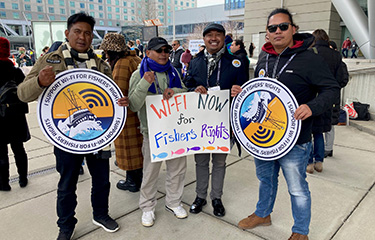On 12 March at Seafood Expo North America in Boston, Massachusetts, U.S.A. migrant fishers, many from Indonesia, protested the lack of mandated Wi-Fi onboard the distant-water fishing vessels they work on.
Global Labor Justice – International Labor Rights Forum (GLJ-ILRF), a non-governmental organization that works transnationally to advance policies and laws that protect workers’ rights, organized the protest. Protesters in Boston included Indonesian fishermen Tunigo and Edi Kasdiwan, who have each worked for Taiwan-based fishing vessels in the 1990s and belong to the Indonesian Seafarers Gathering Forum (FOSPI).
“For us, Wi-Fi communication means everything. While we are working on the high seas for three months to a year at a time, sometimes we don't know what is happening at home. And sometimes we don't know whether our families have food to eat or not,” Kasdiwan said. With Wi-Fi, he said. “We can talk with our families. We can monitor our salaries and know whether we have been paid or not, because in many cases, the manning agencies charge fees or withhold our salaries or take away our salaries.”
The GLJ-ILRF has launched several previous campaigns involving worker rights in the seafood industry, including the Independent Monitoring at Sea (IM@Sea) campaign. In 2022, the GLJ-ILRF initiated a campaign to pressure Taiwanese authorities to add Wi-Fi internet connections to the country’s tuna-fishing fleet, and met with the Taiwan Fisheries Agency to discuss the issue in December 2022. According to the organization, Taiwan has the world’s second-largest distant water fleet after China, with more than 22,000 crew, the majority being migrant workers. Without access to Wi-Fi onboard fishing vessels, fishers are isolated and unable to communicate with their labor organizations, service providers, officials, or their families.
The GLJ-IRLF relayed a recent incident reported by the Yilan Migrant Fishers Union, involving migrant fishers on a Taiwanese vessel operating in Tongan waters without Wi-Fi equipment who claimed they were forced to work 20 hours a day and wrap wounds from their work with wire tapes because there were no bandages.
“After months under these conditions, the fishers were only able to reach out for help when they docked and fellow fishers shared their Wi-Fi connection,” the group said.
Forced labor, physical abuse, murders, and disappearances at sea are among the threats migrant fishers face, according to GLJ-IRLF. They also struggle with insufficient drinking water and food, sanitation problems, lack of onboard safety measures, high recruitment fees that put workers in debt, arbitrary wage deductions, unilateral contract termination and deportation without due process, it said.
“We are in Boston to hold the world’s biggest seafood companies responsible for their supply chains,” GLJ-ILRF Senior Seafood Campaign Coordinator Kimberly Rogovin said. “It’s time for these brands and retailers to come to the table with fishers and ensure that vessel owners respect their rights. These global buyers have the power to improve conditions and ensure communications access for workers in distant-water fleets.”
Other groups involved in the campaign are Indonesian Seafarers Gathering Forum, or Forum Silaturahmi Pelaut Indonesia (FOSPI), Taiwan Association for Human Rights (TAHR), Stella Maris Kaohsiung, and Humanity Research Consultancy (HRC).
Kasdiwan said he has served terms of up to eight months at sea without deboarding. He said the work of a migrant fishermen “crosses between life and death,” recounting his vessel being hit by a typhoon at sea and capsizing, killing everyone onboard except for himself and one crewmate. He said several similar incidents have occurred within the past month.
“We are reminding all the industry stakeholders to take care of us. Do not just take money from our sweat and blood, but also pay attention to our welfare,” Kasdiwan said.
Photo courtesy of Cliff White/SeafoodSource







